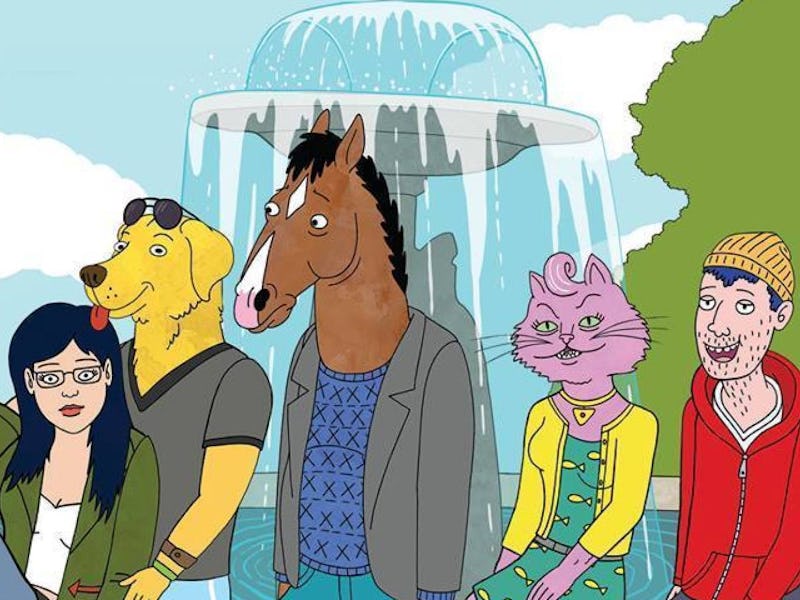'BoJack Horseman' Season 3 Urges Us Not to Fetishize Sadness
Winning is just a lucky break in an endless stream of losses.

There’s something about a dogged failure that is immensely appealing to the 20-somethings of today. Nowhere else in television is there a consistent stable of toxic souls to be relatable with than in Netflix’s BoJack Horseman. To see one of BoJack Horseman’s suffering misanthropes fumble and fail episode after episode isn’t only entertaining, it’s nourishing for the soul.
Back in the age when TV shows and movies featured infallible, heroic characters, those characters were meant to embody certain ideals to strive for. Now, however, when so many people are struggling with their everyday lives, many need some reassurances that what feels like constant screw-ups and mistakes are universal, and hopefully, everything will end up okay after the fact. That BoJack and his stable of equally damaged monster people stumble, destroy their lives, then start the next day anew must be some kind of affirmation that our continuous shortcomings aren’t so bad.
BoJack Horseman Cast
Millennials don’t have savings, homes, pets, families, or heroes. Where millennials diverge from the Gen-X works of Fight Club and Office Space, there feels like a community that’s developed over the mutual bonding over things like “no health insurance” and the “gig economy”. While all heroes will inevitably fail the public, we can do just fine on our own, thanks. Millennials are losers in a game where the rules changed very quickly and suddenly. Having the same kind of loser on television we can relate to? Today, that’s worth a thousand John Waynes.
BoJack, Diane, Princess Carolyn, Mr. Peanutbutter, and Todd are losers and the only reason why they’re mistaken for anti-heroes is the fact that they’ve all found a modicum of success in their professional lives. But there is no sympathy for the Bojack Horsemans of the world, only an uncomfortable recognition of their similarities with ourselves.
There’s this idea that BoJack is an anti-hero, someone whose morally reprehensible behavior somehow serves some greater good. It’s not true. BoJack is a loser through and through, whose newest season tries to hammer in the fact that his self-destruction is getting old real fast. It’s only the wistful thinking that his struggle is in some way heroic that this label persists.
Their “grand struggle” is the fact they’ve awoken to their own self-destructive behavior. As the season persists, BoJack’s new publicist reminds him not to “fetishize his own sadness,” a phrase he regurgitates to Diane later in the episode. This becomes the ultimate theme of the show’s third season, after two seasons of BoJack wallowing in the mire.
By design, BoJack, Diane, and Princess Carolyn are victims of their own narcissism as they are circumstance. While watching them visibly struggle with themselves is a more engaging conflict than with some external enemy, the show is careful to make sure the audience is uncomfortable with the laissez-faire destruction the characters end up causing.
The cruel irony is that these loser characters have been around for a long time. The cast of Arrested Development, Seinfeld, and The Office all featured lovable bands of deadbeats and jerks. While it was fulfilling just to laugh at them, circumstances noticeably changed after 2008. The sort of “selfishness” that used to be funny, quickly became a means of survival. As young professionals, especially those who work in the internet space, work to create “their brands”, narcissism - if it can even really be called that anymore - has become a useful career skill.
Television has always been a playhouse mirror for society. Through its window, we see a refracted version of our own lives. That’s some of the brilliance in BoJack Horseman’s absurd animal-hybrid world. Whereas the show initially used the device as a way to incorporate nonsensical sightgags with animal people behaving according to their species, the physical absurdity just doubles down on the cast’s manic emotional antics. And the show’s realest moments is when it chastises its cast for still pulling the same shit after three years.
BoJack Horseman doesn’t just show that we can be unhappy, selfish, and mean, but reveals even the simple act of realizing our own shortcomings is no victory. It’s why the cast still deserve to be called losers despite their slow inching towards normalcy. The season ends with Princess Carolyn, Diane, and Todd finding better fortunes in the future, and it’s nice to see this as a small victory.
But a “victory” in BoJack Horseman really just means some new revelation in their lives that might make them a little less miserable. Even if a little less misery in everyday life seems like victory enough, plenty of us will continue to be fuck-ups who are kind of shitty and the show actively encourages viewers not to fall for the same traps as the cast.